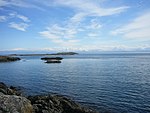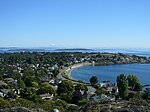Trial Islands Lighthouse

The major Trial Island is home to the Trial Islands Lighthouse which is operated by the Canadian Coast Guard, continues to be staffed by two full-time lightkeepers. The lighthouse was constructed in 1906. The fourth order Fresnel lens from 1906 was used until it was replaced in 1970. That original lens is now on display courtesy of the Maritime Museum of British Columbia in Bastion Square in Downtown Victoria. In September 2009 it was announced that the Trial Island Light would be automated to cut staffing costs. The Oak Bay Heritage Foundation proposed Trial Island Lighthouse for protection through the Heritage Lighthouse Protection Act. Community support including stories and comments are gathered through the Friends of Trial Island Facebook page https://www.facebook.com/trialislandlighthouse Trial Island Lighthouse is Victoria's landmark lighthouse. In 2015, thanks to the work of the Oak Bay Heritage Foundation and strong public support, it was announced that Trial Island Lighthouse had been granted heritage status.
Excerpt from the Wikipedia article Trial Islands Lighthouse (License: CC BY-SA 3.0, Authors, Images).Trial Islands Lighthouse
Radcliffe Lane,
Geographical coordinates (GPS) Address External links Nearby Places Show on map
Geographical coordinates (GPS)
| Latitude | Longitude |
|---|---|
| N 48.395111111111 ° | E -123.30519444444 ° |
Address
Trial Islands Lighthouse
Radcliffe Lane
V8S 2Z3
British Columbia, Canada
Open on Google Maps






